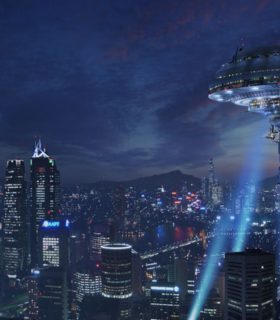This past week, Washington D.C. hosted the National Conservatism Conference, where everyone from Fox News talking heads to populist authors to U.S. senators to war-mongering walruses spent several days trying to fill in the massive gaps in Donald Trump’s head refine their vision of a post-fusionist conservatism.
One of the conference’s four main speakers was contrarian venture capitalist Peter Thiel, who railed against credentialism, interventionist foreign policy, and progressive dominance of Silicon Valley. Yet all of these issues have been discussed by conservatives—as well as “conservatives”—throughout the past decade. By far the most interesting part of Peter’s speech was what he had to say about China.
While there were some of the standard invectives against free trade and opposition to the neo-authoritarian nightmare that is China’s surveillance state, Peter Thiel expanded more on his points about China than any celebrity figurehead of the Right. Let us raise a glass for innovation in Silicon Valley; it’s been far too long since that last happened.
Several of Thiel’s economic arguments were novel, at least for such a mainstream event. First, he said that automation was not a concern in the way Andrew Yang believes, in that all of the jobs that could have been automated already have been. To him, the much greater concern was related to companies “automating” jobs using third world labor, and treating those workers like robots. He singled out China, where workers are often stuck in 19th-century conditions so bad that companies have had to install nets on their factories to catch all the people who attempt suicide by jumping off the roof. Thiel also stated that beyond economic competition, the current tariffs against China represented a form of carbon tax, with China’s industrialization leading to an explosion in their emissions.
Continuing on the thread of China, Thiel turned his attention towards American tech companies, specifically Google and their DeepMind artificial intelligence, with its counterpart OpenAI. As Silicon Valley insiders are aware, OpenAI is an attempt to make sure that DeepMind doesn’t go all SkyNet (or Faro Plague, if you prefer video games) and genocide us all. Thiel was extremely concerned that Google, and Big Tech in general, had, much like Dianne Feinstein’s staff, been infiltrated by Chinese agents.
To Peter, Google’s refusal to work with the U.S. military and subsequently work with China, despite their massive intellectual property theft, is evidence of infiltration and subterfuge. In fact, it is likely that Google has been infiltrated and that they should be investigated for treason by the CIA and/or FBI, as long as the agencies could be bothered to stop busting teenagers with dime-bags of weed and funding “moderate” rebels in Syria.
Thiel is sending a very clear message to Big Tech: work with our enemies and you will be treated like them. It has taken long enough for the Right to figure this out. While I do not support some of Thiel’s security work—to me it’s a little too much like China’s—I support Peter for sending China to the gulag and turning the National Conservatism Circus into a party. I wonder if he convinced that John Bolton walrus freak to get high with him after the event. Who knows how much cocaine you could hide in that mustache?
Freddie Bastiat is a law student whose real name you’ll find out once Andrew Kacynski doxxes him. He’s a fan of hockey, Yoko Taro games, and restoring the Byzantine and Achaemenid Empires. You can find him on Twitter @Tht_Fat_Bastiat.


